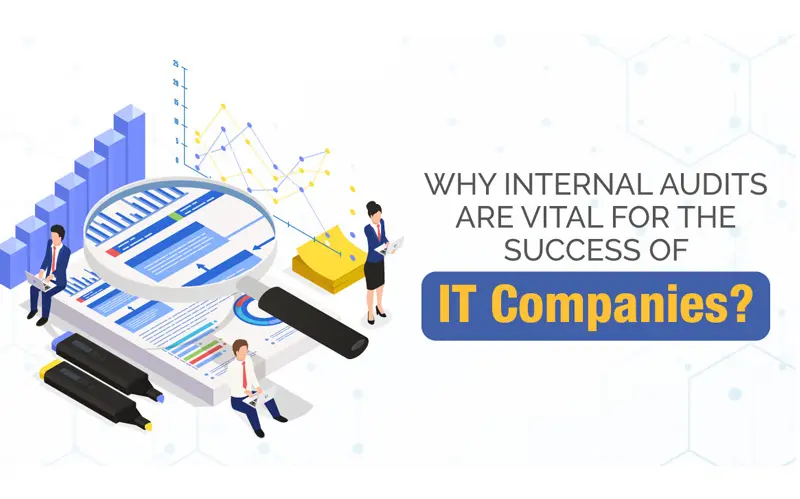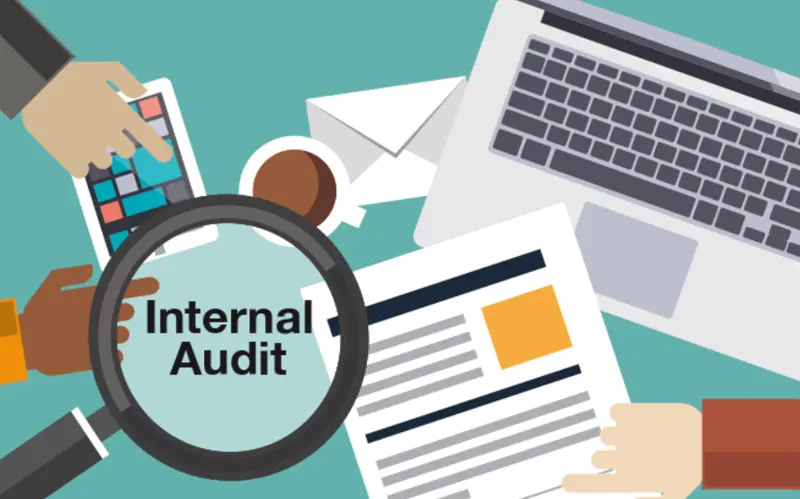

+91 9826266300

10.00 AM - 7.00 PM


Why Internal Audits are Vital for the Success of IT Companies?
Published at: Apr 17,2023

In today’s rapidly changing business environment, Information Technology (IT) companies are encountering numerous challenges such as innovation, business disruption, and stringent legal and regulatory compliance requirements.
A robust Internal Audit system serves as a valuable resource to simplify intricate processes. Thus, IT companies’ systems and procedures can support growth and adapt to dynamic changes in regulations.
The primary goal of conducting an Internal Audit of IT Companies is to fulfill the management’s requirements by offering constructive feedback and recommendations on crucial aspects such as internal controls, risk management, resource utilization, and the effectiveness of management information systems.
The responsibilities of an Internal Auditor are constantly evolving to align with the evolving requirements of the IT Company. Adjustments to audit plans may be necessary to accommodate changes in circumstances, such as the need to expand audit coverage to new areas, provide support to management in resolving issues, or devise internal audit methods.
A well-functioning Internal Audit department plays a crucial role in aiding the IT Company’s board in fulfilling its governance obligations, thereby promoting ethical and effective governance practices. Thus, Internal Auditor contributes significantly to the attainment of the objectives and goals of an IT Company.
Need for Internal Audit of IT Company
The following are the factors that necessitate an Internal Audit of an IT Company:
1. Increased size and complexity of businesses
As IT Companies expand in size and scope, direct managerial oversight may become diluted across various functions, creating a need for a dedicated, independent team to conduct comprehensive reviews and evaluations of operations. The increasing complexity of business operations further emphasizes the necessity of engaging specialized professionals to guide management.

2. Enhanced compliance requirements
The global expansion of IT Companies has resulted in a significant increase in their geographical reach. IT Companies need to cross political borders to access capital and enhance technological capabilities. Hence, compliance with both domestic and foreign laws has become a critical factor in ensuring the success of overseas business operations.
3. Focus on risk management
Internal Auditors can perform their duties more efficiently by concentrating their efforts on areas with higher risk. Internal auditors can utilize the same resources while providing additional value to the IT Company. This focused approach helps improve the overall efficiency of the internal audit process.
4. Stringent Norms
Regulatory bodies are increasingly taking steps to safeguard the interests of investors. They are emphasising promoting ethical business practices, enhancing corporate governance, and bolstering reporting requirements to various boards and committees.
5. Unconventional business models
Modern IT companies are adopting unconventional business models and practices, such as outsourcing non-core activities to third-party organizations rather than managing them in-house.
6. An increasingly competitive environment
The relaxation of regulations and increased globalization has facilitated easier access to markets for goods and services, with free movement of capital, technology, and knowledge between nations, as well as the establishment of robust infrastructure, enhancing the availability of global best practices and technology. This has resulted in a surge of new entrants in existing markets, intensifying competition.
Role of Internal Auditor in IT Company
The key roles of an Internal auditor of an IT Company are:
- Understanding and assessing the risks in IT Companies and evaluating the adequacies of the prevalent internal controls.
- Identifying areas for systems improvement (manual and by automation support) and strengthening controls.
- Ensuring optimum utilization of the resources of the IT Company
- Ensuring proper and timely identification of liabilities, including contingent liabilities of IT Company and taking a merit-based view on contingent liabilities.
- Ensuring compliance with internal and external guidelines and policies of the IT Company.
- Safeguarding the assets of the IT Company and adequacy of title to the assets.
- Reviewing and ensuring the adequacy of information systems security and control.
- Reviewing and ensuring the adequacy, relevance, reliability, and timeliness of management information systems flowing from a common database.
How can Ease Up help?
Ease Up supports, advises, and provides Audit & assurance services to IT companies. Our team of professionals offers extensive technical and industry-specific expertise, empowering you to strengthen key governance, risk management, and control functions while simultaneously elevating overall business performance.
We have worked with IT Companies to:
- We work closely with your IT company to comply with Accounting Standards, Standards on Auditing, Regulatory compliance, and other applicable provisions of the law.
- We customize our audit procedures and work with you to increase the efficiency and effectiveness of the audit process.
- Operate as a fully outsourced provider of internal audit services.

CA Aditya Chokhra
December 13, 2025

Empower Your Business with Expert Financial Consulting
Latest Post
Leave a Reply

Contact us and subscribe to our newsletter to receive expert advice and industry updates.

Mumbai: A-116-1st Floor, Super Shopping Complex, Bajaj Cross Road, Near Kandivali Station, Kandivali (W), Mumbai 400067.
Ahmedabad: 315 Abhinav Arcade, Nr. Kothawala Flats, Paldi, Ahmedabad 380007.
Pune: B 602, The Onyx, Pink City Road, Shankar Kalat Nagar, Pune 411057.
Gurgaon: 1123 JMD Megapolis, Sector 48, Gurgaon - 122018, Haryana.
Bhilwara: C - 147, Shashtri Nagar, Bhilwara (Raj).
Surat: 6019, World Trade Center, Ring Road, Surat - 395002.
Copyright © 2025 Easeupnow. All rights reserved.


















